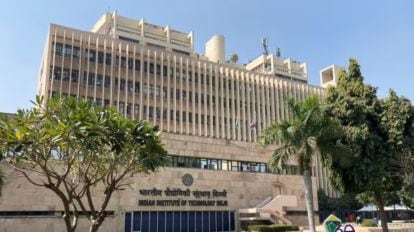04.05.2025.UT news.(Untouchables News of Indía)by Team sivaji.9444917060.asivaji1962@gmail.com.follow us in all Sm.
Out of 642 faculty members at IIT Delhi, 20 are from Scheduled Caste, 8 belong to Scheduled Tribe
The faculty also alleged that research on caste-related issues faces resistance from within the institution
 As per the Central government's reservation norms, institutions like IITs are required to maintain 15% reservation for the SC category and 7.5% for the ST category (Facebook/IIT Delhi)
As per the Central government's reservation norms, institutions like IITs are required to maintain 15% reservation for the SC category and 7.5% for the ST category (Facebook/IIT Delhi)Only 3.1% (20) of the 642 faculty members at the Indian Institute of Technology (IIT) Delhi belong to the Scheduled Caste (SC) category, and just 1.2% (8) are from the Scheduled Tribe (ST) category — a shortfall of 76 SC and 40 ST faculty members, or 11.9% and 6.3% respectively, The Indian Express has learnt.
As per the Central government’s reservation norms, institutions like IITs are required to maintain 15% reservation for the SC category and 7.5% for the ST category.
The data for SC/ST representation across the institute, including teaching staff, students and non-teaching staff, was furnished to the Parliamentary Committee on the Welfare of Scheduled Castes and Scheduled Tribes last month ahead of a review visit on April 11 by the panel’s members, it has been learnt.
In their memoranda submitted to the panel, representatives of students and teachers flagged concerns related to research pushback and placement concerns, among others.

The data, which gave an overview of student representation over a decade, revealed that the intake for the SC category for undergraduate programmes was around 13.85% in 2015-16. This went up to 14.92% in 2024-25. For the ST category, the institute saw a surge from 6.92% to 7.46% in the same period. In postgraduate programmes, the percentage went from 11.27% in 2015-16 to 13.11% in 2024-25 for the SC category, and from 3.54% to 4.31% for ST candidates.

In PhD programmes, the admission for SC students rose to 9.69% in 2024-25 from 8.88% in 2015-16, with ST student admissions surging to 3.28% in 2024-25 from 0.97% in 2015–16.
The Parliamentary Committee’s visit was part of a broader review of the implementation of Constitutional safeguards for marginalised communities by premier institutes.
An official memorandum issued by the Lok Sabha Secretariat on March 26 underlined that the Committee’s “on-the-spot local study visit” would examine “implementation of reservation policy in student admissions, in faculty and non-faculty positions, along with other measures undertaken to safeguard the rights of SC/ST teachers/ad-hoc teachers/employees.”
The Committee, chaired by MP Faggan Singh Khulaste, held interactions with faculty and students during its visit and met with the ST and SC faculty and student representatives to hear their grievances.
Meanwhile, as per sources, IIT Delhi in its responses concerning the faculty representation, stated, “The institute undertakes all the necessary steps to ensure adequate representation from all the categories.. “ Institute specifically encourages applicants from the SC/ST /OBC/EWS category as well as persons with disability. On many occasions, few candidates are shortlisted from the ones who’ve applied, and even fewer are finally recruited. This leads to a scenario where fewer faculty members are on roll than the sanctioned strength.”
On student admissions, the institute in its responses said, “There are no unfilled seats in all course-based programmes.”
In PG and PhD programmes, “some students leave due to the resignations on personal, medical, better job opportunity, and better prospects,” said the institute.
Students and faculty members also submitted memoranda to the panel. “Many departments do not have a single SC/ST faculty,” read the memorandum submitted by teachers’ representatives on April 11.
“The under-representation is severe,” they wrote, pointing out that key hiring panels such as the Recruitment Advisory Committee (RAC) have “increased the workload of SC/ST community and also exposed them to further conflicts and pressure at the department level.”
“So far, no SC/ST faculty has been offered any key administrative position at the level of Dean or Associate Dean,” the faculty memorandum noted.
The faculty also alleged that research on caste-related issues faces resistance from within the institution. “The ethics committee often makes a mockery of the research objectives and does not permit the faculty to even move beyond their title slide to explain the full plan,” the memorandum stated. “Sometimes undignified language is used about the SC/ST community and the researcher,” it added.
Even when projects are approved and funded, faculty members said, “SC/ST faculty receive little support to run their research projects… these challenges are not recognised by the institute.”
Mental health concerns, issues related to scholarships, the need for caste sensitisation, and “the need to ensure zero tolerance towards caste discrimination in placements” were among flagged by students in their memorandum. “The current counsellors are neither trained nor equipped to understand the complexities and trauma arising from exclusion, oppression, and caste-based discrimination,” wrote the students. “This insensitivity has prevented students from availing the services in general.”
“The lack of representation of the SC/ST community among faculty members makes the students feel isolated and less connected with them…” the memorandum read.
Calling for “transparent placement,” they wrote, “Measures should be taken to ensure that students are not asked about the rank/category while sitting for placements…. If any company is found to be engaging in such practices, it should be debarred from attending the placement drive.”
Calls and messages to Khulaste went unanswered. The Indian Express reached out to Press Relations Officer Shiv Yadav and Director Rangan Banerjee but received no response in this regard.





Comments
Post a Comment